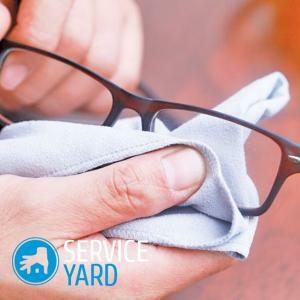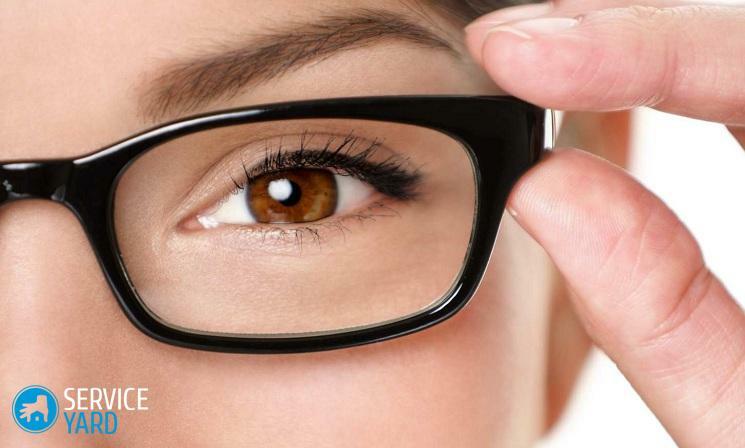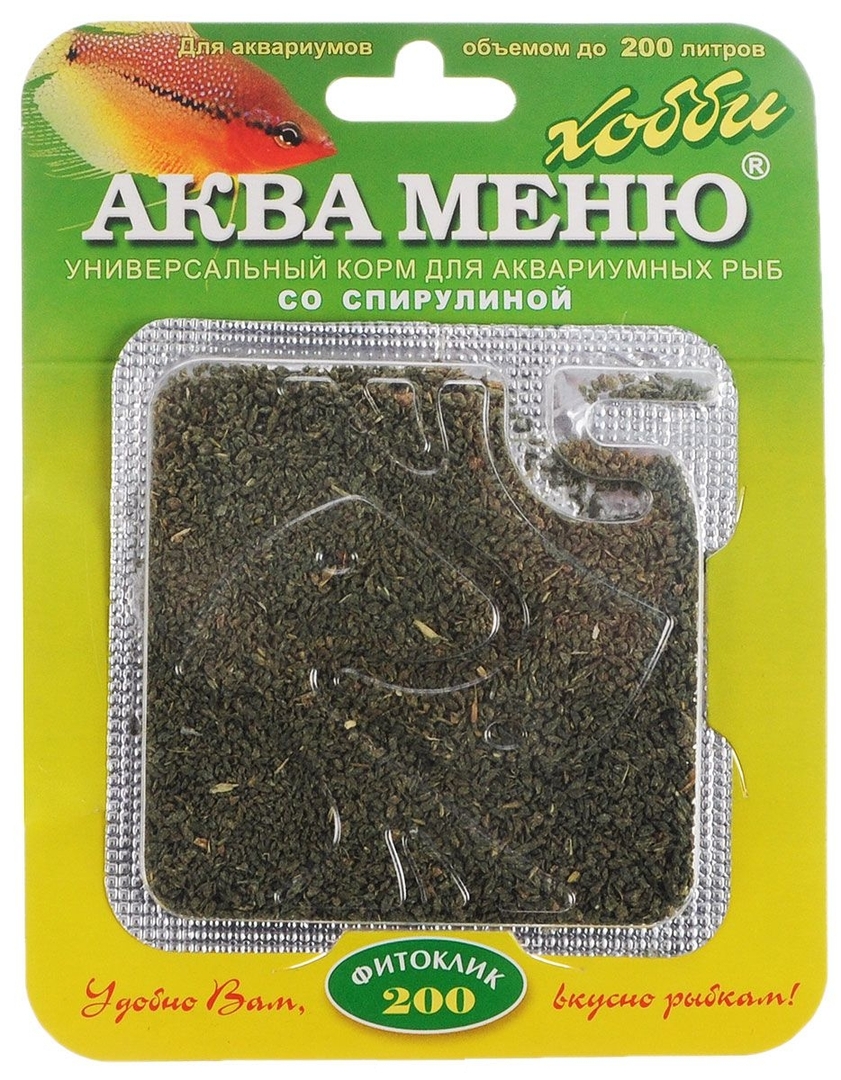
- What are your glasses?
- How do I clean glasses glasses?
- When to wipe glasses?
- Professional tools
- Soft napkins
- Wet wipes
- How to clean glasses with plastic glasses without spray and microfiber?
- Remove dirt from the slots
- What should not be used?
- How to store glasses?
- Some rules of care
Statisticians claim that the glasses are about a quarter of the world's population. This means that with the problem of how to clean glass glasses at home, almost two billion people face each day. At the same time, there are not so many ways to clean glass. About them will be discussed in our article.
to the contents ↑What are your glasses?
Before cleaning glasses glasses, it is very useful to understand what they are made of:
- made of glass;
- made of plastic;
- made of plastic with anti-reflective coating.
Glass
Glass spectacles have existed for several centuries. Their advantages are well known:
- strength;
- hardness;
- possibility of use in complex pathologies of the eyes.
Important! Glass lenses last longer than plastic ones - unless, of course, vision has changed. To scratch such glasses, you need to try very hard or for many weeks not properly care for them( for example, every day to wipe with a hard rag).
The shortcomings of such models are also known to everyone who ever carried them:
- is quite large;
- brittleness;
- need a tight centering;
- is not a very attractive appearance;
- glasses with large dioptres do not always hold in a metal frame.
Important! Weigh glass lenses, especially with large dioptries, fairly, much more than the same plastic ones. This is due to the fact that glasses of a strictly defined thickness are used for vision correction, while in the manufacture of plastic glasses the desired angle of curvature is achieved in completely different ways.

In addition, with the wrong alignment of the lenses a person feels very strong discomfort - in contrast, again from plastic glasses, which do not have such a flaw. In fact, "ochkariki" would have long ago abandoned glass lenses, but with some diseases of another method of correction does not yet exist.
Important! While optical glass - the material is quite strong and not all mechanical influences are equally sensitive, it suffers blows and squeezing quite badly, so it's necessary to handle these glasses carefully.
Plastic
Perhaps, these are the most popular glasses that are enjoyed with pleasure by those who have walked in glass for many decades. The advantages are obvious:
- plastic lenses are much lighter and thinner than glass ones;
- does not require a rigid centering;
- glasses are much cheaper;
- lenses are equally well held in both metal and plastic frames.
Important! But these glasses have one very significant drawback - lenses are very easy to scratch, because they are made of soft plastic.
As for plastic glasses with anti-reflective protective coating, they have the same advantages and disadvantages as simple plastic ones, but need more thorough care.
to the contents ↑How to clean glasses glasses?
Lens care products are entirely dependent on the material from which the glass is made. You can apply:
- sprays;
- special fluids;
- microfibre wipes;
- suede wipes;
- wet wipes;
- soap;
- dishwashing detergent;
- shampoo.
When to wipe glasses?
Fingers from the fingers, street dust, splashes, scales of the skin, remnants of cream, droplets of mascara - not a complete list of what can appear on the lenses. The result and the need to clean glasses glasses at home you will feel quite quickly:
- glasses lose transparency;
- in particularly severe cases - objects appear to be fuzzy;
- contours of objects are blurred and have a rainbow rim;
- before your eyes there are spots with strange outlines.
In all these cases, the mud must be dealt with immediately. It's not just that the stained glasses look ugly and can be seen through them badly. If you systematically look through the lenses with spots, you run the risk of all other troubles with your eyes and get strabismus.
In addition, the glasses need and in daily care, regardless of whether there is visible pollution on them or not. It is better to spend it in the evening, when there is some amount of free time and there is no need to hurry anywhere. You do the hygiene before bed? So why not supplement the daily complex with one more action?
Important! Other situations are possible, for example, when you go to a warm room from a frost. Lenses fog up( with glass it happens more often than with plastic ones) and through them nothing is visible. After some time, the fog will disappear, the glass will again become transparent, but there is not always time to wait, it is much easier to wipe.
to the contents ↑Professional tools
The best option is to clean glasses glasses at home, - the facilities intended for optical devices. Special sprays and liquids are sold in good stores of optics and in pharmacies.
Important! They can be for glass, and for plastic lenses, which you need to ask the seller. The fact is that from the means intended for plastic, the glass will not do any harm( good, really, too), but the plastic spray for glass can damage.
Buy sprays and fluid for glasses is best in specialized stores. On sale there are a lot of fakes, which include substances that can not be wiped with lenses( for example, abrasives and alcohols).
How to apply?
As a rule, such products are produced in a special package, which allows them to be applied to the glass in small doses. The tip resembles a pipette with a blunt tip. In addition to the spray itself, you will also need a soft microfibre cloth( for glass lenses suited suede, which can be bought at the same pharmacy or optical store).
How to use:
- Wash and dry your hands dry.
- Apply to each glass a drop of spray or liquid.
- Distribute the product evenly over the entire surface.
- Dry your glasses gently with a soft cloth.
Such tools perfectly handle all kinds of contaminants that can only appear on the glasses. In this case, strong pressure and sudden movements should be avoided. Rough handling can damage both plastic and glass lenses.
Important! In winter, it may be very useful to use a spray or a liquid that prevents fogging of glasses.
to the table of contents ↑Soft napkins
If you are looking for something to clean glasses for eyesight, pay special attention to the napkins. Microfiber is one of the most popular materials for making items for cleaning and personal hygiene. Do a lot of it - rags for the sexes, napkins for the table or windows.
People in glasses also had time to evaluate its unique properties:
- soft;
- does not scratch the surface;
- removes dust very well;
- easily copes with particles of fats and skin flakes.
This napkin is suitable for both plastic and glass glasses. In order to remove stains, press with your fingers or scratches is not required, a miracle napkin will do everything perfectly without it.
Despite the victorious procession of microfiber, you can still see suede napkins on sale. They are almost in no way inferior to microfiber - a little thicker and occupy a little more space in the case. Is it possible to wash a napkin for glasses? Usually this is not required, but if necessary, nothing will prevent it from being done.
to the table of contents ↑Wet wipes
Wet disposable wipes are an extremely convenient means of personal hygiene. Including, and for the care of points. On sale you can find packages of soft napkins, impregnated with special solutions, for a variety of purposes. It is best to look for those that are recommended for glasses. In a hypermarket or hardware store, these may not be, but in the optics store you will certainly recommend the right ones. But generally for the care of glasses fit any wet wipes.
Important! In addition to the fact that such napkins perfectly clean any dirt, they still prevent the reproduction of bacteria, because they are impregnated with an antibacterial composition.
to the contents ↑How to clean glasses with plastic glasses without spray and microfiber?
And what if the spray is over, and the fact that you need to buy wet wipes, flew out of your head? Nothing bad happened. Some of the agents are for sure at home:
- soap;
- shampoo;
- dishwashing detergent.
Option 1
For this method any toilet soap is suitable - it is best liquid, of course, but if it is not, you can take any:
- Procedure start with washing your hands with the same soap.
- Dampen glasses under the faucet from both sides - it's better if the water is warm, but not hot.
- Moisten your thumb and forefinger.
- Lather them.
- With light movements of these fingers, soap the glass.
- Rinse all this with water.
- Put the glasses on a paper towel or napkin so that the glasses stand upright.
- Allow them to dry.
Important! Sometimes there is no time to wait for the glasses to dry, but at the same time, they can not be wiped with the first rag or paper. The only option is to gently wipe with a paper towel, but never to rub. This procedure can not be repeated often.

Option 2
Shampoo or dish washing agent is suitable for this method. The main thing is that they do not have aggressive components. You need another container, in which you can completely immerse the glasses:
- Fill the vessel with water.
- Add a few drops of detergent.
- Immerse the glasses in the solution.
- Get the glasses.
- Rinse the soap solution with running water.
- Blot the lens with a soft cloth.
- Put the glasses on a paper napkin so that the glasses stand upright, allow to dry.
Rinsing under the stream of water
If there are no visible stains on the panes, you can do without shampoos. You need:
- faucet with warm water;
- soft cloth.
The procedure itself is extremely simple and is accessible to literally everyone.
- Open the water - the jet should not be very strong.
- Hold the glasses under it for about half a minute.
- Wipe the glasses with a soft cloth.
- Put the glasses on the towel so that they dry completely.
Important! Whatever you are wiping the lens, you need to do it from side to side, and not in circular motions.
to the contents ↑Remove dirt from the slots
The design of the glasses is such that in their different parts there are a lot of hollows and slits, where dirt gets clogged with great pleasure. It should be periodically disposed of. For this, you need cotton buds or toothpicks.
We proceed further to clean the glasses:
- Remove dirt from the slots.
- Rinse the glasses the way you normally do.
- Dry them.
Important! This procedure should be done a couple of times a month.
to the contents ↑What should not be used?
In the house there are always a lot of things that seem to be suitable for the care of glasses, but they should not be used. Such subjects include:
- shreds;
- handkerchiefs;
- clothing;
- ammonia:
- is just alcohol;
- vinegar,
- liquid for washing glasses and mirrors.
Rags and rags
Why not use, for example, the remains of an old T-shirt? The fabric is so soft! In fact, it only seems soft and causes microcracks, especially on plastic. Glass lenses without any coating can sometimes be wiped with soft tissues, if there is no other way out, but this should not always be done.
Important! As for the edges of clothing, this habit is even more dangerous. Not only is it ugly, when a person suddenly raises a hem from anything, and starts to rub something. The edge of the clothing is usually made more coarse, so the likelihood of microcracks appearing on the lenses increases.
Chemicals
Alcohol and vinegar in this situation are simply useless, when it comes to glass glasses without coating, but they can do a lot of damage to plastic. So it's better to keep them while you are fiddling with glasses, somewhere on the far shelf.
Important! As for the liquid for washing windows, it is absolutely not suitable for plastic, for glass coated glasses - too. Simple glass lenses can be processed in principle, but this is an extreme option, when there is nothing else at hand.
to the contents ↑How to store glasses?
Points are a delicate and demanding subject. Do not throw them on the table or put them on a shelf without any litter. The best option is to buy a case. They are:
- Soft. Soft cover is made mostly of leather, dense fabric or imitation leather. Inside, he has a soft lining. Convenient compact version, but it has one problem - if you press on it, the glasses will crack.
- Hard. Hard case in all respects is more convenient and reliable. Usually it is made of durable plastic, which withstands not particularly serious mechanical loads. To test a plastic box, throwing it under the car, of course, is not worth it, but if you suddenly accidentally sit on it - nothing will happen to the glasses. This, of course, does not at all mean that optics should be stored in a chair, it is best to choose a place for it on the shelf, which is easy to reach, but which is high enough.
Important! On sale there are metal and wooden boxes for glasses - in short, there are plenty to choose from. In the case you can put not only the glasses themselves, but also care products - for example, a napkin made from microfiber or one-time in an individual package.
to the contents ↑Some care rules for
How to take care of glasses so that they are not lost or broken?
- Buy a chain, especially if you like outdoor games and outdoor activities.
- When you put on your glasses or remove, hold them with both hands behind the arms.
- Do not put such a fragile object with the glass down, especially on a hard surface.
- After removing the glasses, immediately put them in the case.
- Remember that plastic does not really like temperature changes and direct sunlight.
In this article we told you what and how to clean glasses glasses, their arches and other details. Choose what will be more convenient for you, and keep your accessory in a clean and tidy condition, so that always clear visibility was ideal.


